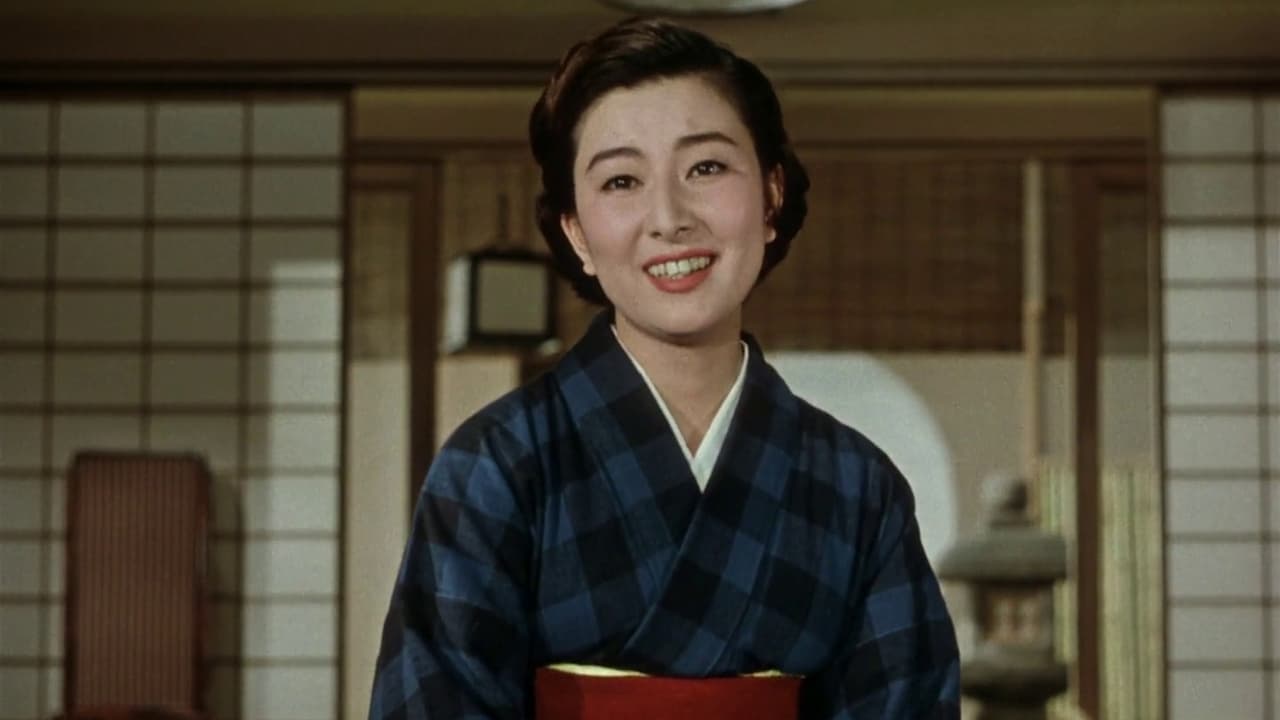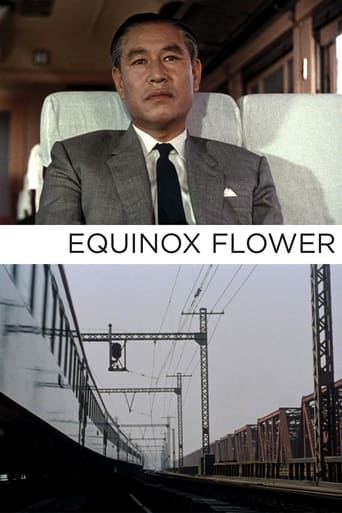Evengyny
Thanks for the memories!
Fluentiama
Perfect cast and a good story
Senteur
As somebody who had not heard any of this before, it became a curious phenomenon to sit and watch a film and slowly have the realities begin to click into place.
Mathilde the Guild
Although I seem to have had higher expectations than I thought, the movie is super entertaining.
WILLIAM FLANIGAN
Viewed on DVD. Restoration = ten (10) stars. To paraphrase an old burger chain ad: Where's the movie? Notable actors are present (Kinuyo Tanaka delivers a particularly poignant wordless performance while the younger actresses tend toward hyper line readings). So are the Director's trademarks including: scene padding; "back acting"; clothes lines; ugly overhead electrical lines to power trains; and static camera. The film score seems just right and is delivered in the right places on the sound track. Cinematography (color) and sound are fine. Subtitles are OK. But the film lacks direction BIG time. The Director conveys to the viewer the impression (rightly or wrongly) of having an astounding lack of interest in most of the scenes he is ostensibly directing as well as the film as a whole! Part of the problem seems to stem from a very weak story line and a lackluster script. Set decoration is minimal. Interior sets look terribly familiar and seem to have been little changed over the past 10 years or so. Skip this one or be prepared to be seriously bored. WILLIAM FLANIGAN, PhD.
Ilpo Hirvonen
The emptiness of the space in the very first images of "Equinox Flower" makes an impact on the viewer. An opening of this sort resembles those of Ozu's most famous films such as "Late Spring" and "Tokyo Story". However, soon we find out that "Equinox Flower" differs quite remarkably from these since it is essentially a comedy. In the first scene of the film Ozu instantly introduces the marriage motif -- a recurring subject in his oeuvre -- as two railroad workers are wondering the great amount of newly-weds. Only few artists have been able to establish a theme and set a tone, which are fully consistent with the rest of the work, so quickly yet still with such restraint and precision. Therefore, it is certain to the viewer from the start that what unfolds is the craft of a master. At its heart, "Equinox Flower" is a tender comedy because it fluently combines two aspects, which too often appear as contradictory, the ironic and the melancholic. Striking is also the fact that the film is Ozu's first comedy in approximately two decades. One must go back to the silent days to find a benchmark. This choice of return seems to coincide with Ozu's new sympathy (though I use the word hesitantly) for the younger generation, whereas he so often has sympathized the elders. It seems to me that in "Equinox Flower" the lightness and hopeful attitude towards life, noticeable in Ozu's earlier films, merges with the Chekhovian wisdom and elegiac tone of his later oeuvre. To an extent, "Equinox Flower" is a satirical treatise on the decline of parental and especially patriarchal authority in the Japanese family and society. However, Ozu is never hostile nor aggressive. He doesn't point out. He reveals. Although there are moments when Ozu lets us laugh at the protagonist's helplessness when trapped by his own outdated norms, Ozu never attacks on him. In addition to theme, Ozu's return to comedy also marked a turning point in his visual development because he used color for the first time, which later on became an inseparable element in his subsequent films. As a consequence, the world of colors in "Equinox Flower" is strikingly rich and precisely considered, leaving the viewer with several memorable and widely associative visual motifs. "Equinox Flower" is in many ways what one might call a simple film. There's not much of a story going on, let alone action of any kind, nor surprising twists in plot. Nonetheless, the viewer (any viewer whether an admirer of Ozu or not) is left with a powerful impact by the rich simplicity of the visuals; and the utter beauty of details. Above all, "Equinox Flower" is purely based on Ozu's unique poetry of the mundane; a vital principle in his cinema. Due to this simplicity, many western viewers have blamed, or at least explained their discontent, Ozu's films for a slow pace, but this criticism, however, doesn't really hit the mark because Ozu's films precisely create their own time in the poetic universe which differs from our world. In this rhythm or, in fact, Ozu's perception of time lies profound melancholy. The days go by, the clothes line dances in the wind, and emptiness prevails. In "Equinox Flower" the older generation remembers the war-time days, recalling especially its better times of carefree coexistence. In turn, such ideals as personal happiness and privacy threatened by the old, arranged, communal joy throb beneath the youth's dialogue. Ozu's characters are often aware of this melancholy -- human transience in the passage of time -- which brings sadness to their existence. A sensation that the old is about to vanish is always present, though so is the characters' ability to accept things as they are. As time is such an important theme for Ozu, his films can never be summed up with mere concepts such as "comedy" or "tragedy" since their (aesthetic) perspective is never restricted, but always reach to the most profound perspective of all, which is that of philosophy.
SnakesOnAnAfricanPlain
Equinox Flower was Ozu's first color film. He was reluctant to do it, but he shouldn't have been. He handles the addition so well. The colors really do join every scene together. Equinox Flower deals with one father's hypocritical view of love and marriage. It begins at a wedding where Hirayama makes a speech to his friend's daughter. He says how lucky they are to be able to choose their own partner. He does this in front of his wife in a very awkward moment. Hirayama and Kiyoko's relationship is interesting. They make their marriage work, even if there wasn't love there at first. They work together and never feel that they are trapped in this relationship. Despite his new world views during this wedding, once his daughter announces she wishes to marry a man, Hirayama is opposed. His hypocritical views are the cause of much comedy. He is also forced to face his prejudices as he finds a daughter of an old friend who has run away to be with her struggling musician boyfriend. Hirayama is supportive of everyone but his own daughter. Again though, with Ozu's eloquence, Hirayama is not a villain. It is understandable that he has different views concerning his own daughter. A group of men sit around and discuss the differences between sons and daughters. The growth of the whole family is well plotted and emotional. It's another wonderful and gentle deconstruction of Japanese family values.
sharptongue
This is the first Ozu film I've seen, though I did see a film about him many years ago. Therefore, I am aware of Ozu's liking for a particular and eccentric camera angle, and his apparent preference for an acting style which is, depending on your point of view, understated, stilted or highly restricted. Ozu appears to like portraying what is perhaps the reality of a culture which values conformity.Take a tip - adjust quickly to the apparently straightjacketed acting. This is an excellent cast, whose talent shines through even Ozu's iron hand.
And it makes the humour even more effective. I was astonished at just how much I, and the rest of the audience, laughed out loud at a few of the scenes. I find it difficult to simply convey why it works. Suffice to say Ozu is clearly a master of the slow buildup. There's a scene where the father takes one of his employees to a bar, to meet a girl who is the daughter of one of his friends. The girl has run away and cut off contact with her dad. The central character tries to get her to at least talk it over. The humour of this scene revolves around the acute embarrasment the junior employee feels, as a regular patron. Ozu milks this scene for every last laugh with a master's touch. Sounds dull as I've written it, right ? Well, on screen, it's a killer.After this film, I'll look forward much more to my next Ozu.

